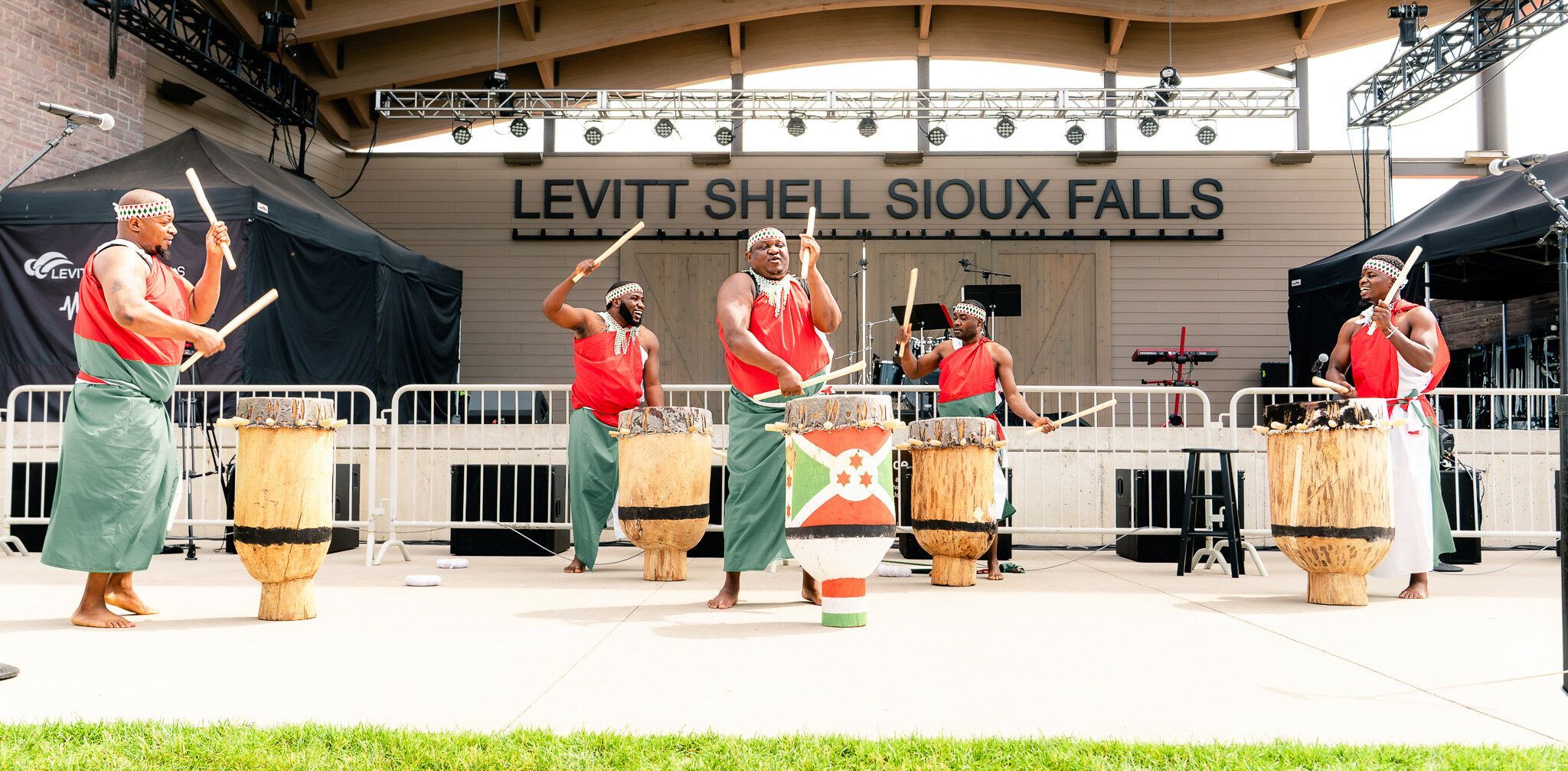Burundian Drummers' Debut Performance Is at Festival of Cultures
Reuben Niyubahwe's desire to connect his children—and the wider community—to an intangible piece of his Burundian heritage spurred a partnership with the LSS Multi-Cultural Center.

Swinging open the doors of The Coliseum on a Sunday afternoon, you encounter a sound unlike any other in Sioux Falls: hypnotic chants, thunderous booms, the snaps and cracks of wood against wood. Seven members of the Royal Drumming group, Abatimbo, move in sync, pounding handmade instruments from their native Burundi.
Their play feels spontaneous. They jump and twirl with joy and intention, responding to one another’s beats. Their rhythm reflects the hours they’ve spent practicing in the historic gymnasium since November.
“Royal drums are a significant symbol for the Burundian community,” explains Reuben Niyubahwe, the group’s founder. “They’ve been a strong cultural tradition from the past until now. When people hear the drums, they come together.”
Reuben’s desire to connect his children—and the wider community—to an intangible piece of his heritage spurred a partnership with the LSS Multi-Cultural Center: a program focused on making space for a wide variety of community-based, cultural or educational events in Sioux Falls.
“Every month, there’s something—different cultural or educational gatherings,” says Valeria Wicker of the Multi-Cultural Center.
Just this year, the Multi-Cultural Center has hosted Diwali with the Hindu Temple of Siouxland; Timkat, an Ethiopian Orthodox celebration; and a commemoration of the Rwandan genocide.
Reuben’s group is one of many participating in a pilot program through the Multi-Cultural Center that gives cultural leaders and organizations regular access to the Coliseum space for meetings or rehearsals.
“We’re now refining the process to be more of a partnership,” Wicker explains. “We consider Reuben and his team a partner, because they’re doing something on an ongoing basis that furthers our mission.”
BUILDING COMMUNITY THROUGH CULTURE
Like Reuben, many of Abatimbo’s members have lived in Sioux Falls since 2008.
“We felt like we were missing a part of our original place,” Reuben explains. “Last year, we were finally able to bring our traditional drums here.”
Traditional Burundi drums are carved from a single hollowed-out trunk of the Cordia africana—a flowering tree that grows only in Burundi. Dried calfskin is then stretched over the top to create the drumming surface, and the tension is tested for tone and pitch.
The unique quality and construction of the drums are key to their cultural significance. Reuben spent more than four months coordinating approval before getting the drums shipped—first by taxi, then by plane.
Once they arrived, Reuben worked with LSS to formalize the group and organize space for the seven men and their 50-pound drums to practice.
“They felt like it was a very good thing we were bringing, and so they helped find a place for us, and now we’re moving forward.”
A TRADITION RECLAIMED AND SHARED
Abatimbo’s debut performance took place at the Festival of Cultures on June 14. The powerful, high-energy tribute to Burundian culture included drumming, singing, dancing and a cheering audience beaming with pride.
It was something of a full-circle moment for Reuben.
Born and raised in a Tanzanian refugee camp, Reuben was approved to enter the U.S. when we he was 20 years old. His family, along with many of the 300 Burundian families in Sioux Falls, belong to the “1972 Burundians”—a group who fled an ethnic genocide that resulted in the deaths of an estimated 200,000 people.
“I’ve never even been to Burundi. I don’t know what it looked like. But we stay together as a family, and we keep in mind the memories of where we came from.”
Upon his arrival in the U.S., Reuben was connected to the LSS Center for New Americans, which supports refugees and immigrants as they begin new lives in South Dakota.
“When you come from overseas, you don’t know the area or the systems. They helped me feel comfortable in the community.”
LSS gave Reuben an orientation to life in the U.S., helping him find work and housing, supporting his basic needs and being a source of stability during his transition.
“They kept following up with me, asking how I was doing in the community. They showed me how to get to the hospital, where to get food. They were like my family here in the U.S.”
Nearly two decades later, Reuben has a wife and kids, a stable career as a machine operator and—through Abatimbo—has become a community leader, carrying forward a rich cultural and artistic practice bringing texture, energy and life to Sioux Falls.
“They’re a great example of cultural engagement,” says Wicker. “Where else can you find seven Burundian drummers performing on hand-carved drums, brought all the way to South Dakota?”

